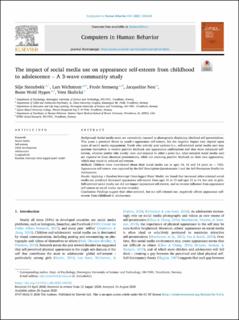The impact of social media use on appearance self-esteem from childhood to adolescence – A 3-wave community study
Steinsbekk, Silje; Wichstrøm, Lars; Stenseng, Frode; Nesi, Jacqueline; Hygen, Beate Wold; Skalicka, Vera
Peer reviewed, Journal article
Published version
Permanent lenke
https://hdl.handle.net/11250/2829373Utgivelsesdato
2020Metadata
Vis full innførselSamlinger
- Artikler (Articles) [173]
- Publikasjoner fra Cristin - DMMH [138]
Sammendrag
Background: Social media users are extensively exposed to photographs displaying idealized self-presentations. This poses a potential threat to youth’s appearance self-esteem, but the negative impact may depend upon types of social media engagement. Youth who actively post updates (i.e., self-oriented social media use) may position themselves to receive positive feedback and appearance confirmation and thus show enhanced self- esteem, whereas youths who mostly view and respond to other’s posts (i.e. other-oriented social media use) are exposed to these idealized presentations, while not receiving positive feedback on their own appearance, which may result in reduced self-esteem.
Methods: Children were interviewed about their social media use at ages 10, 12 and 14 years (n =725). Appearance self-esteem was captured by the Self Description Questionnaire I and the Self-Perception Profile for Adolescents.
Results: Applying a Random Intercept Cross-lagged Panel Model, we found that increased other-oriented social media use predicted decreased appearance self-esteem from ages 10 to 12 and ages 12 to 14, but only in girls. Self-oriented social media use did not impact appearance self-esteem, and no reverse influence from appearance self-esteem to social media use was revealed.
Conclusions: Findings suggest that other-oriented, but not self-oriented use, negatively affects appearance self- esteem from childhood to adolescence.

